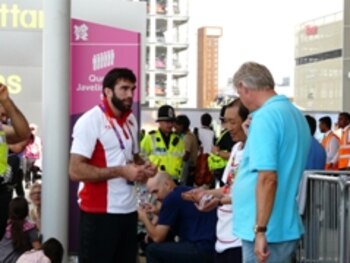
(ATR) Olympic pin traders in London complain of harassment by security, a ban on selling pins and fewer swaps with the public because of the high cost of acquiring souvenir pins.
"We’re frustrated because the rules change every day," Don Bigsby, president of the Olympin Collectors Club, tells Around the Rings. "It’s constant harassment of, ‘Who told you to stand here? Where are you from?’"
Bigsby, winner of the inaugural Samaranch Award given by the IOC for his contributions to memorabilia collecting, was among those who secured passes to the Olympic Village and were thrown out for trading with athletes.
Doug Todd, a veteran pin trader from California, tells ATR, "Anywhere around the Westfield mall you were immediately asked to move on by Westfield security. It did not matter if you were selling pins or not. They allowed pin traders to set up at the Stratford train station because that was not mall property."
The Stratford International train station gives traders access to media and the Olympic Village because both are nearby. Many traders become media celebrities because they’re easy pickings for stories by reporters and camera crews on their way to the MPC and IBC.
Cameras help security make sure no one is selling.
Todd says the Olympic Park, which includes a Coca-Cola sponsored pin trading area, was good for trading, but "You had to have a ticket to get in and tickets were very hard to come by. The Londoners were very friendly, but did not show much interest in pins. Some of the volunteers were getting into pins but they had constant exposure."
Volunteers tell ATR that they were told not to put pins on their lanyards, but as the Games progressed, more and more adopted the practice anyway.
"I think the London Games were great for sport," Todd says, "but not so great for pin trading due to limited access to trading and limited interest by the locals – especially when compared to Beijing."
Bigsby says a "flea-market atmosphere" in Beijing, where selling was rampant, must have contributed to the London prohibition on selling pins. However, he said it was hard for beginners to get into the hobby because "in order to trade, you have to go in the store and spend 7 pounds for a pin. I could have sold them a USA rings pin for 50 cents."
Traders set up outside the Olympic Village, where hot pins included the Burkina Faso dated pin, a dated Tuvalu, the Team GB pin given to the athletes and the NBC camera pin with or without the flashing light. Mascot pins did not appear to be in demand.
David Blair, a trader from Australia, tells ATR, "Everybody’s asking for Jamaica because it’s Bolt Fever. I’ve seen a couple of different Jamaicas, but I don’t have one."
The coveted participation medals will be given only to athletes and not officials or press, making them a hot commodity. Some athletes sell their medals in thewaning days of the Games,which has become an Olympic tradition, but it is unclear if the selling ban applies to them.
"Would they get in trouble?" Bigsby asked. "You never know until you do something. ‘Oh, that’s a new rule.’"
Blair, who is attending his fifth Olympics as a pin trader, says it is, "OK here. Every Olympics we go to it’s a new thing for the organizers and security because they don’t seem to realize it’s going to happen. And they sometimes don’t realize that it’s important not only for us as collectors, but also for the athletes and other people because they like to trade. It’s fun and everybody enjoys it."
Anyone who trades with Ed Schneider of New York gets a handshake. "You always make a friend," he says. "Pin trading has been pretty good. I’ve had a really good time dealing with the residents of London and England. Everybody’s been nice."
Blair expected to go home with 500-1,000 pins, "which I’ll frame up and that’s my London. Then (the traders) go back in the cupboard and Rip van Winkle wakes up in 2016 and goes off to Rio."
Reported by Karen Rosen.
20 Years at #1:
Últimas Noticias
Sinner-Alcaraz, the duel that came to succeed the three phenomenons
Table tennis: Brazil’s Bruna Costa Alexandre will be Olympic and Paralympic in Paris 2024

Rugby 7s: the best player of 2023 would only play the medal match in Paris

Rhonex Kipruto, owner of the world record for the 10000 meters on the road, was suspended for six years

Katie Ledecky spoke about doping Chinese swimmers: “It’s difficult to go to Paris knowing that we’re going to compete with some of these athletes”



